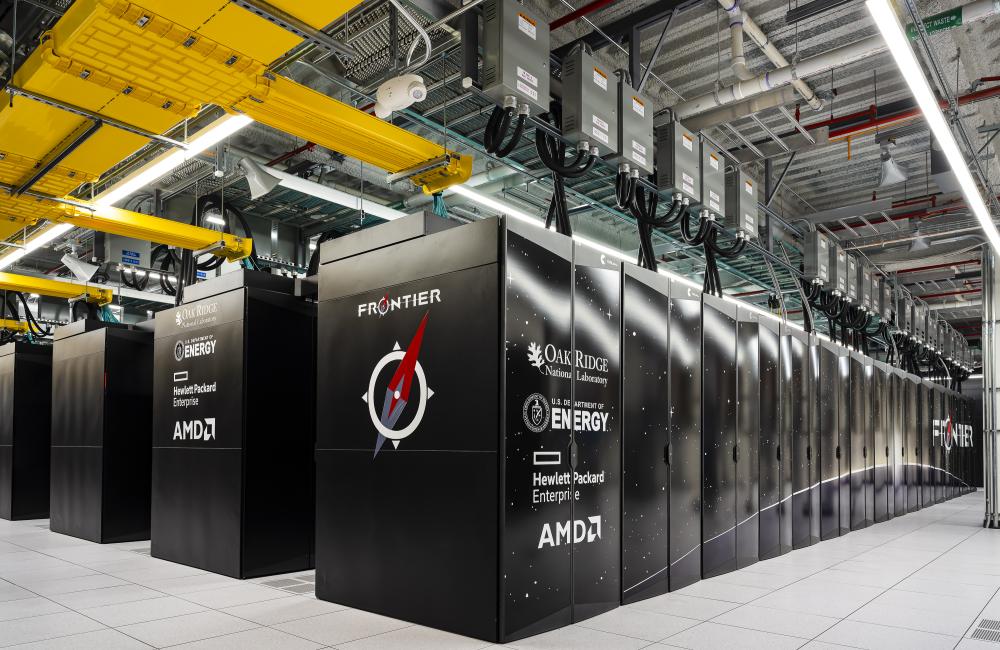Innovations in artificial intelligence are rapidly shaping our world, from virtual assistants and chatbots to self-driving cars and automated manufacturing. Seizing on the potential of AI to transform science, the nation’s leading experts in science and technology have released a blueprint for the United States to accelerate progress by expanding its capabilities in AI and big data analysis.
"AI for Science, Energy, and Security" lays out a comprehensive vision for the Department of Energy to expand its work in scientific use of AI by building on its existing strengths in world-leading high performance computing systems and data infrastructure.
“The seamless integration of AI across science, energy and national security demands groundbreaking progress in developing AI systems that are safe, robust, transparent, trustworthy and energy efficient,” said Prasanna Balaprakash, director of AI programs at ORNL. “By prioritizing the research directions outlined in the report, we not only guarantee sustainable and safe AI enabled innovation but also strengthen the United States' global leadership in pioneering scientific advancements, resilient energy infrastructure and national security.”
The report is the product of a series of workshops held in 2022 under the guidance of DOE’s Office of Science and the National Nuclear Security Administration. The sessions brought together over 1,000 scientists, engineers and staff from DOE labs, academia and technology companies to talk about the rapidly emerging opportunities and challenges of scientific AI.
The report identifies six AI capabilities and describes their potential to transform DOE’s program areas. These range from control of complex systems like power grids and nuclear reactors to foundation models like the large language models behind generative AI programs such as ChatGPT. The report also lays out the crosscutting technology needed to enable these AI-powered transformations.
“Advances in AI could dramatically change the way we pose and solve scientific problems,” said Rick Stevens, associate laboratory director of Computing, Environment and Life Science at DOE’s Argonne National Laboratory who co-led the workshops and report development. “There’s so much untapped potential for AI innovations to both drive new scientific discoveries and speed up the pace of those discoveries. DOE is the natural leader for developing trustworthy, responsible AI to support our nation’s energy transition and nuclear deterrence efforts.”
The report describes scientific grand challenges where AI plays a major role in making progress toward solutions. These include transportation, autonomous laboratories, national security and the development of next-generation novel materials.
“Leveraging the unique capabilities of DOE national labs, we are equipped to tackle the hard challenges that arise from the development of such AI systems,” Balaprakash said.
DOE is uniquely positioned to extend the United States’ global leadership in science, energy and security, the report notes. DOE operates the world’s most powerful supercomputers including the new exascale systems Frontier, Aurora and El Capitan, encompasses the world’s largest collection of experimental facilities and employs over 50,000 people at its 17 national laboratories.
Six DOE national laboratories led the AI workshop series and resulting report: Argonne, Lawrence Berkeley National Laboratory, Lawrence Livermore National Laboratory, Los Alamos National Laboratory, Oak Ridge National Laboratory, and Sandia National Laboratory.
The report is available at https://www.ornl.gov/ai-initiative/overview.
UT-Battelle manages ORNL for the Department of Energy’s Office of Science, the single largest supporter of basic research in the physical sciences in the United States. The Office of Science is working to address some of the most pressing challenges of our time. For more information, please visit energy.gov/science.



